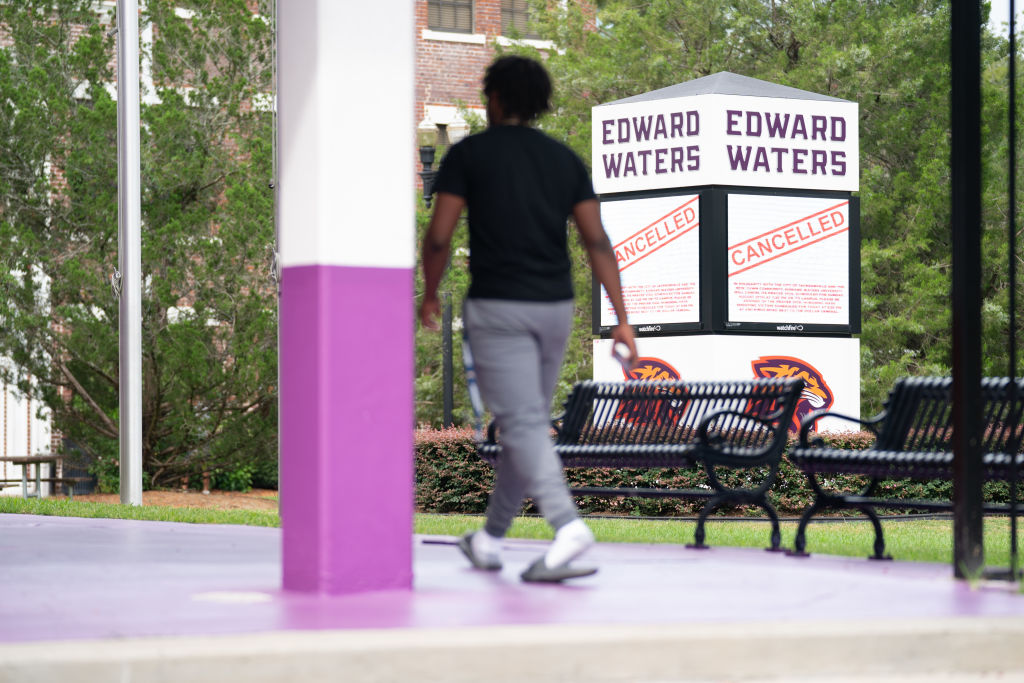Jacksonville Update: HBCU Funding Calls Renewed For Security
Jacksonville Racist Shooting Renews Calls For More HBCU Funding To Boost Black College Campus Security

Edward Waters University on August 28, 2023, in Jacksonville, Florida. | Source: Sean Rayford / Getty
Calls are being amplified for there to be more funding for the nation’s historically Black colleges and universities (HBCUs) in the wake of the white supremacist mass shooting in Jacksonville over the weekend.
As the state of Florida pledges $1 million to help boost security at Edward Waters University – where racist gunman Ryan Palmeter visited minutes before gunning down three Black people with an assault rifle adorned with swastikas – the lack of resources has become glaring; not just that small, private Christian college in Jacksonville but also mostly all of the other HBCUs around the country.
MORE: The Jacksonville Shooting Wasn’t ‘Racially Motivated,’ It Was Racist. There’s A Difference
Palmeter ended up being chased off campus, thanks to a vigilant group of Edward Waters students and a quick-acting campus officer. And while that left Edward Waters’ campus in the clear, removing Palmeter from the immediate equation certainly doesn’t eliminate the threat that his demonstrated white supremacist violence remains posing against Black people and particularly, Black college students.
That’s why Edward Waters’ president on Monday was among the most prominent voices renewing calls for more HBCU funding. During a press conference, Dr. A. Zachary Faison, Jr., specifically lamented a “lack of resources” and accurately noted how “the future of our nation is inexplicably connected to educating against white supremacy. Our children’s lives are at stake.”
Faison’s words aren’t hyperbole. Lest we forget, it wasn’t even a year ago when there was an ongoing, monthslong series of bomb threats against HBCUs, repeatedly disrupting life on dozens of Black college campuses with anti-Black terror. That is to speak nothing of the heavily armed white man who in April – just five months ago – was arrested on the campus of North Carolina A&T University in the possession of a reported two handguns, two shotguns, one rifle, a crossbow, a machete, stun gun, hatchets, knives, choking devices, pepper spray, a blow dart gun, brass knuckles, and other weaponry in his vehicle. He also had more than 1,000 rounds of various ammunition.
While no violence resulted in any of the above examples of threats against HBCUs, Black colleges remain in the crosshairs of white supremacists, Faison and other HBCU advocates said.
And so it followed that Faison called on the Biden Administration to “do even more to secure our HBCU schools who are under deliberate and vicious attack.”
Later in the day, Faison echoed that same sentiment with a social media post “requesting the passage of legislation specifically directing federal dollars to fortify our nation’s HBCU campuses in wake of targeted acts of racial violence at the hands of white supremacist.”
The United Negro College Fund, a historic organization advocating for HBCUs that counts Edward Waters among its members, also cited racist threats as a primary reason why additional funding is so crucial for Black colleges. The next step in securing Black college campuses must go down the legislative route, UNCF said.
Calling the incident on Edward Waters’ campus “a continuum from the racially motivated threats on HBCUs the entirety of 2022,” Lodriguez V. Murray, UNCF’s senior vice president for public policy and government affairs, said Congress hasn’t matched the urgency shown by the situation at hand.
“All year long, we have asked Congress to protect HBCUs, and now is the time to pass the Homeland Security appropriations bill with language that directs the Federal Emergency Management Administration (FEMA) to provide $100 million for HBCUs (annually) via the non-profit grants’ security program,” Murray continued. “This program must administer the funds directly to HBCUs, not by the state governments. This will help HBCUs to be protected against threats by increasing security, developing plans on how to respond beyond simply calling the police, heighten the use of technology to monitor campus entry points, and make our environments the safe haven for learning they should be for the sake—and mental health and security—of our students.”
The U.S. Department of Education’s (DOE) Project SERV (Project School Emergency Response to Violence) initiative awarded more than $1 million in grants to HBCUs that were targeted and disrupted by racist bomb threats last year, the federal agency has said. Project SERV describes itself as specifically working to help institutions of higher learning affected by violent threats.
And while generous, those grants were split between four HBCUs, none of which included Edward Waters. In addition to using the grants for security, the four schools – Claflin University ($440,000), Delaware State University ($217,000), Howard University ($203,000) and Texas Southern University ($191,962) – all said they intend to use the funds to bolster wellness and mental health services needed following the bomb threats.
It now stands to reason that similar services are likely needed on the campus of Edward Waters University and other HBCUs perhaps more than ever.
Just two weeks ago, Howard University took steps to strengthen campus security after a vicious melee broke out near the HBCU’s residence halls on Aug. 13. While the violence wasn’t described as race-related, Howard still said it planned to install more than 1,000 cameras across campus, install card readers to control access to certain campus buildings, bolstered its security with an armed officer will be stationed in front of residence buildings and supply students with an emergency device they can use to call for help.
Last year, Biden’s Administration made a $2.7 billion investment in HBCUs across the country from the American Rescue Plan. Of that total, Edward Waters received $13,228,709, according to the White House.
Statistics also show that federal funding of HBCUs has increased every year under Biden’s presidency.
But in the vast scheme of things, especially when dealing with the field of higher education, it pales in comparison, if you will, to the type of funding enjoyed by the most elite universities in America.
A study from May found that HBCUs receive 178 times less foundation funding than Ivy League schools – $5.5 billion to $45 million in 2019, when the most recent statistics were available.
The study’s author chalked the gaping discrepancy up to “philanthropy.” But other factors included waning corporate support.
“A few participants explicitly stated that systemic racism has led to philanthropic underfunding and suggested that foundations have a moral imperative to support HBCUs to mitigate longstanding inequities,” the study found in part.
“The inequities are embedded and sanctioned by state governments, the federal government and by private industry,” N. Joyce Payne, founder of the Thurgood Marshall College Fund, told Forbes last year. “They say to the white schools, you can drive a Bentley, but the Black schools are told they can’t get a car at all.”
SEE ALSO:
What’s The Truth About Biden’s Commitment To HBCU Funding?
No ‘Joke’: Jacksonville Racist Shooting Spotlights How DeSantis Downplayed NAACP Travel Advisory
















